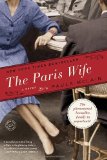Summary | Excerpt | Reading Guide | Reviews | Beyond the Book | Readalikes | Genres & Themes | Author Bio

A Novel
by Paula McLainONE
The very first thing he does is fix me with those wonderfully brown eyes and say, "It's possible I'm too drunk to judge, but you might have something there."
It's October 1920 and jazz is everywhere. I don't know any jazz, so I'm playing Rachmaninoff. I can feel a flush beginning in my cheeks from the hard cider my dear pal Kate Smith has stuffed down me so I'll relax. I'm getting there, second by second. It starts in my fingers, warm and loose, and moves along my nerves, rounding through me. I haven't been drunk in over a year--not since my mother fell seriously ill--and I've missed the way it comes with its own perfect glove of fog, settling snugly and beautifully over my brain. I don't want to think and I don't want to feel, either, unless it's as simple as this beautiful boy's knee inches from mine.
The knee is nearly enough on its own, but there's a whole package of a man attached, tall and lean, with a lot of very dark hair and a dimple in his left cheek you could fall into. His friends call him Hemingstein, Oinbones, Bird, Nesto, Wemedge, anything they can dream up on the spot. He calls Kate Stut or Butstein (not very flattering!), and another fellow Little Fever, and yet another Horney or the Great Horned Article. He seems to know everyone, and everyone seems to know the same jokes and stories. They telegraph punch lines back and forth in code, lightning fast and wisecracking. I can't keep up, but I don't mind really. Being near these happy strangers is like a powerful transfusion of good cheer.
When Kate wanders over from the vicinity of the kitchen, he points his perfect chin at me and says, "What should we name our new friend?"
"Hash," Kate says.
"Hashedad's better," he says. "Hasovitch."
"And you're Bird?" I ask.
"Wem," Kate says.
"I'm the fellow who thinks someone should be dancing." He smiles with everything he's got, and in very short order, Kate's brother Kenley has kicked the living room carpet to one side and is manning the Victrola. We throw ourselves into it, dancing our way through a stack of records. He's not a natural, but his arms and legs are free in their joints, and I can tell that he likes being in his body. He's not the least shy about moving in on me either. In no time at all our hands are damp and clenched, our cheeks close enough that I can feel the very real heat of him. And that's when he finally tells me his name is Ernest.
"I'm thinking of giving it away, though. Ernest is so dull, and Hemingway? Who wants a Hemingway?"
Probably every girl between here and Michigan Avenue, I think, looking at my feet to keep from blushing. When I look up again, he has his brown eyes locked on me.
"Well? What do you think? Should I toss it out?"
"Maybe not just yet. You never know. A name like that could catch on, and where would you be if you'd ditched it?"
"Good point. I'll take it under consideration."
A slow number starts, and without asking, he reaches for my waist and scoops me toward his body, which is even better up close. His chest is solid and so are his arms. I rest my hands on them lightly as he backs me around the room, past Kenley cranking the Victrola with glee, past Kate giving us a long, curious look. I close my eyes and lean into Ernest, smelling bourbon and soap, tobacco and damp cotton--and everything about this moment is so sharp and lovely, I do something completely out of character and just let myself have it.
TWO
There's a song from that time by Nora Bayes called "Make Believe," which might have been the most lilting and persuasive treatise on self-delusion I'd ever heard. Nora Bayes was beautiful, and she sang with a trembling voice that told you she knew things about love. When she advised you to throw off all the old pain and worry and heartache and smile--well, you believed she'd done this herself. It wasn't a suggestion but a prescription. The song must have been a favorite of Kenley's, too. He played it three times the night I arrived in Chicago, and each time I felt it speaking directly to me: Make believe you are glad when you're sorry. Sunshine will follow the rain.
Excerpted from The Paris Wife by Paula McLain Copyright © 2011 by Paula McLain. Excerpted by permission of Ballantine Books, a division of Random House, Inc. All rights reserved. No part of this excerpt may be reproduced or reprinted without permission in writing from the publisher
Your guide toexceptional books
BookBrowse seeks out and recommends the best in contemporary fiction and nonfiction—books that not only engage and entertain but also deepen our understanding of ourselves and the world around us.